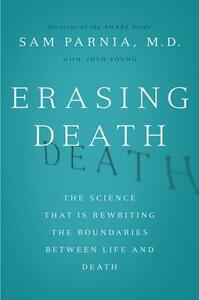Take a photo of a barcode or cover
10 reviews for:
Erasing Death: The Science That Is Rewriting the Boundaries Between Life and Death
Sam Parnia
10 reviews for:
Erasing Death: The Science That Is Rewriting the Boundaries Between Life and Death
Sam Parnia
This book had two drawbacks, however. It is very dry, which is ok since it's written by a doctor. That's to be expected. The other problem is that it repeats itself quite a bit, not unlike a dissertation, where someone is trying to prove something over and over again. It works at first but gets to be a bit too much later on.
I love the topic of what would happen after dying and this was a good scientific way to tackle that. The downside was that the writer is REALLY repetitive with a lot of things he mentions, but at the end having a lot of scientific background and studies to back up his point of view of resucitation medicine and what happens to one’s soul after dying was fascinating.
But the rest of the book was pretty uneven. Near-death experiences are always interesting to me, but the supposed "proof" that NDEs aren't related to brain activity because, allegedly, brain function ceases 10 seconds after your heart stops is, well, unfounded. The brain isn't on or off. Like the process of death that Dr. Parnia tries to explain (and he does a great job creating the paradigm shift that death needs a different definition and is a process not not necessarily an event), the process of brain damage is also just that -- a process. Not all of your cells die at once and, presumably, not all activity between the neurons ceases immediately. There's much science doesn't know yet.
I experienced an NDE with my grandfather in the moments he was dying (whether it was a dream based on my mental obsession over his death or a spiritual response to my prayers that I could help him through the terrifying-for-him journey is something I don't know or necessarily expect to or care to ever know; thank you, William James (see also Varieties of Religious Experience on the practicality of belief)), so it's not that I don't believe there can't be something metaphysical about the thing. But the way Parnia talks about the process of death, it makes sense to me that the brain may, indeed, be involved in a person's near-death experience.
That said, the science he's talking about is remarkable. They've found that automatic compressions, careful oxygenation, and low temperatures can preserve a body long after brain activity has ceased. If the cells don't pop or decay, and the cause of death can be remedied, a person can be brought back when the body is ready. The implications for consciousness are fascinating.
The author seems a bit full of himself as he consistently brags about his accomplishments which is a bit of a turn off for caring about what he has to say. Still, if I ever go into cardiac arrest, I hope I end up in the hospital he works in.
I felt like this book was about two completely different subjects, ones that certainly overlap, but could still have their own books respectively.
The book starts by diving into the topic of resuscitation science and current state of our knowledge about what happens when someone goes into cardiac arrest. This portion of the book was the best part in my opinion. It explores the need for a new set of standards in cardiac arrest care and offers suggestions on how we can implement such standards. In the process it also goes into the details the expose how what we thought was the life/death boundary has had the goal markers moved, and how they may move further in the future.
The second portion of the book starts to dip into the area of NDEs, or near death experiences, and the definition of a soul. At this point I began to fear that this book was going to stop being about science and start going into paranormal subject matter. Thankfully, the author did not go down that rabbit hole and kept the discussion within the realm of scientific investigation and his involvement in the AWARE study. The downside of this was that there was nothing truly new to report on the subject, just a rehash of long debated ideas. As such, I felt it's inclusion in the book didn't really add anything.
So, in the end I am unable to give this book more than 3 stars. It's worth a read to learn about the latest science in resuscitation, it left me discovering nothing new in the arena of NDEs, consciousness, and the soul.





